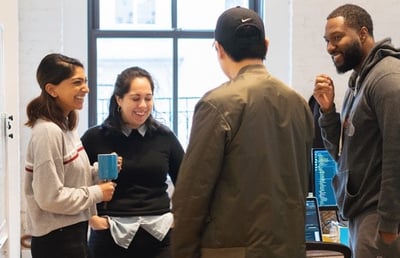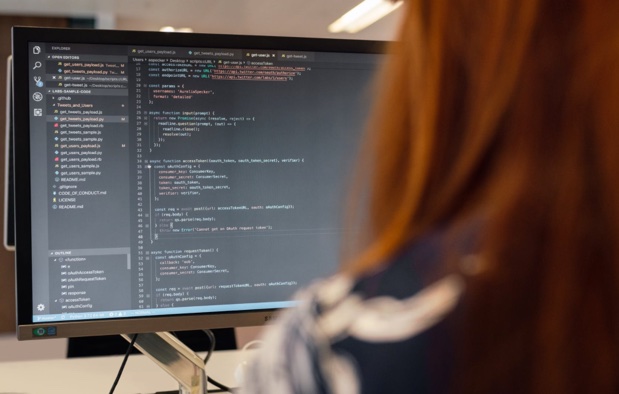Codesmith Engineers Are Making a Difference during COVID-19
As the COVID-19 pandemic spreads around the world, people increasingly turn to technology companies to get them through both global health and financial crises. Many companies are shifting or accelerating their efforts to build products to alleviate the crisis in a variety of ways.
An application that uses Bluetooth to identify people who’ve been in close contact with COVID-19 patients, a facial-recognition technology to track people who are supposed to self-quarantine, or something simple like an app for neighbors to connect and help each other during the outbreak - software engineers play a critical role in developing products like these that can make an enormous difference across the globe.
Sophie graduated from Codesmith’s NYC Software Engineering Immersive program last year. She now works as a front-end software engineer at a company that develops applications for first responders.
In this interview, Sophie shares her path to becoming a software engineer with Codesmith, how she stays productive when working from home, and more insights into the software her company is building in this time of crisis.
For privacy reasons, we cannot disclose details about the company where Sophie works.
1. Please give a short intro about yourself and your background before Codesmith.
I grew up in Arizona and moved out to New York in 2009. In college, I majored in English with a concentration in creative writing. After graduation, I worked for a while in the travel industry — I got to see a lot of the world and have experiences that I’ll treasure for a long time. In 2013, I got a Master’s in International Education and worked in that field for a while. All this is to say my technical background was limited to an HTML course I took in college. The humanities and social sciences were my comfort zone, and I never thought I was the type of person who could code, so it never even occurred to me to try it.
2. Why did you decide to transition into Software Engineering and apply to an immersive program?
It started with a couple of factors: job insecurity due to layoffs at my then-employer and Amazon’s announcement of a new campus in Long Island City.
My employer was having round after round of layoffs, and I knew it was only a matter of time for me. I was already living on the edge and was afraid that Amazon would drive rent prices up, making it impossible for me to be able to afford to live in New York any longer. I’d heard about engineering immersive programs and started researching different options at the same time I started to teach myself how to code.
A few months later, the new Amazon campus was no longer happening, but I was hooked. Coding engaged my mind and problem-solving skills, and I took to it readily in a way I didn’t anticipate. It was clear to me that this was what I wanted to do professionally, and an immersive was the best way to change careers quickly.
When my time came to be laid off, I felt hopeful rather than panicked.
3. What made you choose Codesmith specifically?
After thoroughly researching software engineering immersive programs in the New York area, I felt that my greatest chance of success would be with Codesmith. The sense of community there made me feel immediately welcome, and it made me believe that I could thrive in the program. The pedagogical approach was meticulously well-thought-out to create a charged learning environment that meshed well with how I learn. The hiring program looked like it was going to be worth the cost of tuition alone.
4. What was your experience like when studying at Codesmith?
Not gonna lie, it was tough. The hours are long, and the material is challenging. Once I was even so frustrated, I cried. However, at no point did I feel like I couldn’t continue or that I didn’t have the support I needed to make it through. Even if I hadn’t gotten home until 10pm the night before, I was always excited to get up early in the morning to go back to do more.
5. What was the community like when you were in the program? Are you still in touch with your cohort mates?
The community in my cohort was incredible! The people really made my experience, and I think Codesmith did a lot to foster that sense of community. Everyone was kind and supportive — we had a lot of fun (from the noise we made, sometimes maybe too much fun), and we all cooperated to get some amazing projects done. The days at Codesmith are so long, and it’s so important to like the people you’re with for all those hours. Codesmith does a good job with curating their cohorts.
It’s been almost a year since we started the program, and it’s natural to drift apart, but I’m still in touch with a few of them. I know I’ve made friends for life.

6. How did Codesmith help you get your first job as a software engineer?
Codesmith’s hiring program is thorough, to say the least, and their approach to the job hunt is completely different to anything I’d come across before. They went through draft after draft of our resumes and covered the general application process for software engineering positions. I also got tons of tips and tricks that helped me get two offers. I didn’t just get a job; I had options, which is something that’s never happened to me in my career before. I chose the company that I thought was going to have a community similar to what I had experienced at Codesmith. I knew I wanted that in my everyday working life.
RELATED: CODESMITH'S GRADUATE OUTCOMES
7. What is your current role?
I work as a front-end software engineer at a company that develops applications for first responders. We make both a record management system, a dispatch system, and a few other smaller products. My team has four other engineers, a tech lead, a designer, and a project manager, and we work on the record management system end of things, developing new features and fixing the occasional bug.
8. What is your favorite part about working there?
How much time do you have? A lot of the things that I loved about Codesmith - I love about my job. I think the company is wonderful at fostering a positive environment that makes room for fun along with the hard work. I love my coworkers. They’re talented, generous individuals who are incredibly supportive of me and where I am in my career. Moreover, it’s wonderful to see my work tangibly contribute to making society a little safer.
9. How have you been adjusting to working remotely? Any advice on how to stay productive when working from home?
It’s not been easy. I’ve been working from home for two months now, and I lost the first couple of weeks of productivity in the adjustment. What got me back on track was reconnecting with the passion I feel when I get to build things from scratch. My company put on an internal hackathon, and I joined a project that I became passionate about. I have a wonderful tech lead who, when he saw how much it meant to me, made room in the next sprint for me to refine and finish the project. I carried the focus I re-developed from that project forward.
My advice: Unbroken blocks of time are crucial — it’s difficult to get into flow state when you are being interrupted constantly. Set aside a large block of time where you don’t have any distractions. Try to plan your meetings for the edges of the day or around lunch so you’re not interrupted in the middle of the morning or afternoon.
10. Can you share some insights on the product that you’re working on for first responders?
For my team, it’s business as usual. We’re continuing to improve the product that we already have. However, in this time of crisis, my company has put together software to help departments capture information that provides actionable data on how the virus is affecting their agencies. Tracking COVID-19 exposures and quarantines enables command staff to make informed decisions about deploying the limited number of healthy personnel in their agencies and helps keep their team members and community safe by limiting exposure.
My company is donating a year of this new service to any U.S. public-safety agency that would like to use it. I wasn’t on the team that put this together, but those who were are enormously talented, and they put the product together impressively quickly.
11. How do you feel about being able to build something that matters so much now and makes a difference for so many people?
I’m enormously proud to be part of a company that makes applications for first responders, who are so crucial in this time of crisis. They are the first people on a scene in an emergency, and whatever we can do to help, whatever I can do to help, I’m proud to do.
12. What’s your advice to someone who’s considering changing their career into Software Engineering?
Do it! Switching my career into software engineering is the best decision I’ve ever made.
Look, software engineering isn’t for everyone. It requires a high level of comfort with discomfort. There’s always going to be something more to learn, and you’re frequently going to feel out of your depth throughout your career. But if you have perseverance and curiosity, you will probably love software engineering.
Learning to code is a balance between being patient with yourself while at the same time being diligent and never content in your learning and growth. All the clichés apply here: it’s a marathon and not a sprint; put one foot in front of the other; you will get there if you keep going! Cliché, but true. Keep going! It’s worth it.
